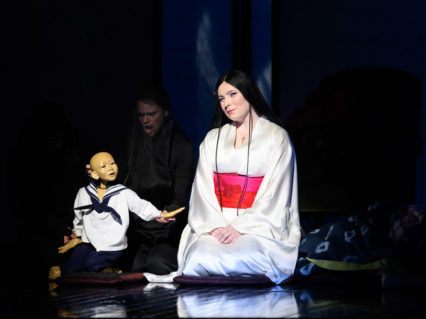David Truslove was at London’s Coliseum for the English National Opera’s (ENO) revival of Anthony Minghella’s Olivier Award-winning production; Giacomo Puccini’s Madam Butterfly.

Swansea-born Natalya Romaniw is now arguably Wales’s greatest operatic export since Bryn Terfel. In recent years, she has been steadily wowing audiences in appearances with Scottish Opera (Eugene Onegin), English National Opera (La bohème) and Garsington Festival (The Bartered Bride). She’s now taken on Giacomo Puccini’s Madam Butterfly for the ENO – with previous experience gained through a night understudying the title role with Welsh National Opera – and last week she gave a sensational debut as Cio-Cio San. If some singers seem to be made for specific roles (one thinks of Bryn Terfel from Verdi’s Falstaff), then Madam Butterfly is surely made for Romaniw who acts and sings with wonderful assurance, as if to the manner born.
Her portrayal of the abandoned Japanese wife is a highly credible creation, coy when she first meets Lieutenant Pinkerton, yielding shy admiring glances, coldly formal to the unwanted advances of Prince Yamadori and blindly trusting in her husband’s return. Her self-possession is matched by a voice of considerable strength and beauty, soaring through the high notes in the opening sequence and thereafter producing ardour, compassion and, not least, physical stamina. Her ‘Un bel di’ arrives with fierce concentration, stunning for its heart-breaking conviction.
We’re now in the seventh revival of Anthony Minghella’s exquisite staging of Giacomo Puccini’s Madam Butterfly – premiered in 2005 at ENO – and fast approaching legendary status in all its sumptuous, cinematic extravagance. There’s no sign of this production (directed by Glen Sheppard) looking tired – the bright blocked colours from Peter Mumford’s lighting and Han Feng’s iridescent costumes (imagine the contents of a box of Quality Street spilling onto the stage when you see the geisha girls) are as vivid as ever and Michael Levine’s ‘anywhere’ set still holds the eye with its sliding paper screens as fragile as the marriage contract that Pinkerton exploits.
Most striking is the Japanese puppetry and beautifully choreographed dancing (courtesy of Carolyn Choa), complete with lanterns and cherry blossom that form a startling background for the love duet at the end of the first act. Elsewhere, origami seagulls wheel and scoop through the air, a whole terrace of roses adorn Butterfly’s apartment when she waits for her husband’s ship. But it is the casting of their young son (replete in a sailor-suit) as a Japanese Bunraku puppet that creates one of the evening’s lasting impressions. Three masked puppeteers from Blind Summit Theatre orientate the wooden doll, Sorrow, so artfully as to create for him a strange realism. The effect brilliantly captures the notion of his helplessness in a situation over which he has no control, and his manipulation equally mirrors the idea of his mother being a mere plaything, defenceless against Japanese convention and colonial exploitation. Further heart-wrench comes from the dying moments of Butterfly as two dancers grip the ends of her red silk obi and carve out a bloodless death in sinuous movements that shape an understated but, nonetheless, horrifying ballet.
Dimitri Pittas as the cold-hearted Lieutenant Pinkerton in time might be able to tone down his stage-filling tenor. It’s an impressive but unwieldy instrument on which critics have previously commented he delivered a steely Don José for WNO’s Carmen last year. We were in no doubt about his loyalty for his native country when the words ‘America forever’ rang out with all the power of an acetylene torch. There was no doubt either of his indifference to Butterfly, but by the end one felt his genuine remorse.
By contrast, Roderick Williams as the avuncular yet perturbed US Consul; warm in voice and personality, his nuanced and oak-aged baritone a perfect foil to the unremitting heft of Pittas. Stephanie Windsor-Lewis as Butterfly’s faithful servant Suzuki is efficiently sung, but never quite emerges with a distinct personality, her patience and frustration only loosely delineated. Other roles bring clarity of tone and line from Alasdair Elliott as a condescending Goro, Keel Watson makes for a commanding Bonze and Njabulo Madlala is a substantial Prince Yamadori. Lastly, Katie Stephenson draws some sympathy for her diffident Kate Pinkerton.
The chorus and orchestra of ENO were in fine form, the latter making the most of Puccini’s lavish score and helped in no small measure by the resident musical director Martyn Brabbins who fashioned a dynamic account, sensitive as ever to colour, tempo and weight. But without a doubt Natalya Romaniw was the jewel in the crown of Puccini’s enduring tear-jerker. Watch out for her later this year in Dvořák’s Rusalka at Garsington.











